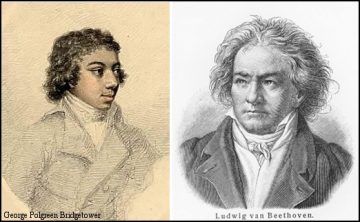per il Mulatto Brischdauer
gran pazzo e compositore mulattico
………. ––Ludwig van Beethoven, 1803
The Bridgetower
If was at the Beginning. If
he had been older, if he hadn’t been
dark, brown eyes ablaze
in that remarkable face;
if he had not been so gifted, so young
a genius with no time to grow up;
if he hadn’t grown up, undistinguished,
to an obscure old age.
If the piece had actually been,
as Kreutzer exclaimed, unplayable––even after
our man had played it, and for years,
no one else was able to follow––
so that the composer’s fury would have raged
for naught, and wagging tongues
could keep alive the original dedication
from the title page he shredded.
Oh, if only Ludwig had been better-looking,
or cleaner, or a real aristocrat,
von instead of the unexceptional van
from some Dutch farmer; if his ears
had not already begun to squeal and whistle;
if he hadn’t drunk his wine from lead cups,
if he could have found True Love. Then
the story would have held: In 1803
George Polgreen Bridgetower,
son of Friedrich Augustus the African Prince
and Maria Anna Sovinki of Biala in Poland,
traveled from London to Vienna,
where he met the Great Master
who would stop work on his Third Symphony
to write a sonata for his new friend
to premiere triumphantly on May 24th,
whereupon the composer himself
leapt up from the piano to embrace
his “lunatic mulatto.”
Who knows what would have followed?
They might have palled around some,
just a couple of wild and crazy guys
strutting the town like rock stars,
hitting the bars for a few beers, a few laughs . . .
instead of falling out over a girl
nobody remembers, nobody knows.
Then this bright-skinned papa’s boy
could have sailed his fifteen-minute fame
straight into the record books––where,
instead of a Regina Carter or Aaron Dworkin or Boyd Tinsley
sprinkled here and there, we would find
rafts of black kids scratching out scales
on their matchbox violins so that some day
they might play the impossible:
Beethoven’s Sonata No. 9 in A Major, Op. 47,
also known as The Bridgetower.
.
by Rita Dove
from Sonata Mulattica
W.W. Norton, 2009
